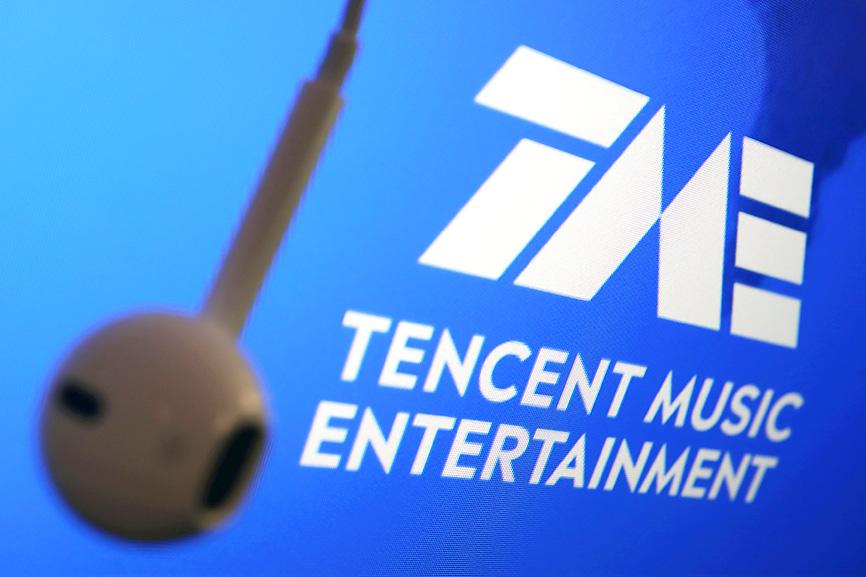China’s antitrust regulator is to order the music streaming arm of Tencent Holdings Ltd (騰訊) to give up exclusive rights to music labels, which it has used to compete with smaller rivals, two people with knowledge of the matter said yesterday.
The Chinese State Administration for Market Regulation (SAMR) would also fine it 500,000 yuan (US$77,222) for lapses in reporting the acquisitions of apps Kuwo (酷我) and Kugou (酷狗), the people said — a milder penalty than the forced sale indicated earlier this year.
SAMR, Tencent Holdings and Tencent Music Entertainment Group (騰訊音樂娛樂集團) did not respond to requests for comment.

Photo: Reuters
The move is the latest in a clampdown to curb the economic and social power of China’s once-loosely regulated Internet giants. The campaign, which began late last year, has included a record 18 billion yuan fine on e-commerce firm Alibaba Group Holding Ltd (阿里巴巴) for abusing its market position.
In April, it was reported that SAMR aimed to fine Tencent Holdings at least 10 billion yuan, while the social media leader was lobbying for leniency, and that regulator had told Tencent Music it might have to sell Kuwo and Kugou.
Instead, SAMR would no longer require a sale, but would impose the maximum 500,000 yuan fine for not properly flagging the 2016 app purchases for antitrust review, the people said.
“Personally, I think this punishment falls short and is even a boon for Tencent. The acquisitions obviously would restrict competition in the market, and should have been vetoed,” said You Yunting (游雲庭), a lawyer with Shanghai-based DeBund Law Offices (大邦律師事務所).
“It is too little a hit to Tencent Music’s dominant position in the market,” said You, a commentator on antitrust law.
Reuters could not determine whether Tencent Holdings faces any further antitrust penalty beyond the expected ruling on Tencent Music, China’s dominant music streamer.
On Saturday, SAMR said it would block Tencent Holdings’ plan to merge China’s two biggest video game streamers — Huya Inc (虎牙) and DouYu International Holdings Ltd (鬥魚) — on antitrust grounds, confirming an earlier Reuters report.
Tencent Music, China’s equivalent to Spotify Technology SA, had been pursuing exclusive streaming rights with labels including Universal Music Group, Sony Music Group and Warner Music Group Corp to fend off competition.
It became the subject of a SAMR investigation in 2018, which stopped the following year after the company agreed not to renew some of its exclusive rights, which normally expire after three years.
It nevertheless kept exclusive rights to music from some acts, including Taiwanese pop singer Jay Chou (周杰倫), who is one of the Chinese-speaking world’s most influential artists.
After SAMR’s latest ruling, Tencent Music would at least be able to retain rights to music from some domestic indie acts, a person with knowledge of the matter said.
Losing exclusive rights means Tencent Music would likely have to redouble efforts to build a more interactive and lively community to engage with its users. The firm has also been diversifying its content through long-form shows and live talk shows to attract more paying users as well as advertisers.
Tencent Music is facing a mounting challenge from ByteDance Ltd (字節跳動), which is using its Douyin (抖音) app — its Chinese version of TikTok — to promote music backed by sophisticated algorithms.

Intel Corp chief executive officer Lip-Bu Tan (陳立武) is expected to meet with Taiwanese suppliers next month in conjunction with the opening of the Computex Taipei trade show, supply chain sources said on Monday. The visit, the first for Tan to Taiwan since assuming his new post last month, would be aimed at enhancing Intel’s ties with suppliers in Taiwan as he attempts to help turn around the struggling US chipmaker, the sources said. Tan is to hold a banquet to celebrate Intel’s 40-year presence in Taiwan before Computex opens on May 20 and invite dozens of Taiwanese suppliers to exchange views

Application-specific integrated circuit designer Faraday Technology Corp (智原) yesterday said that although revenue this quarter would decline 30 percent from last quarter, it retained its full-year forecast of revenue growth of 100 percent. The company attributed the quarterly drop to a slowdown in customers’ production of chips using Faraday’s advanced packaging technology. The company is still confident about its revenue growth this year, given its strong “design-win” — or the projects it won to help customers design their chips, Faraday president Steve Wang (王國雍) told an online earnings conference. “The design-win this year is better than we expected. We believe we will win

Chizuko Kimura has become the first female sushi chef in the world to win a Michelin star, fulfilling a promise she made to her dying husband to continue his legacy. The 54-year-old Japanese chef regained the Michelin star her late husband, Shunei Kimura, won three years ago for their Sushi Shunei restaurant in Paris. For Shunei Kimura, the star was a dream come true. However, the joy was short-lived. He died from cancer just three months later in June 2022. He was 65. The following year, the restaurant in the heart of Montmartre lost its star rating. Chizuko Kimura insisted that the new star is still down

While China’s leaders use their economic and political might to fight US President Donald Trump’s trade war “to the end,” its army of social media soldiers are embarking on a more humorous campaign online. Trump’s tariff blitz has seen Washington and Beijing impose eye-watering duties on imports from the other, fanning a standoff between the economic superpowers that has sparked global recession fears and sent markets into a tailspin. Trump says his policy is a response to years of being “ripped off” by other countries and aims to bring manufacturing to the US, forcing companies to employ US workers. However, China’s online warriors